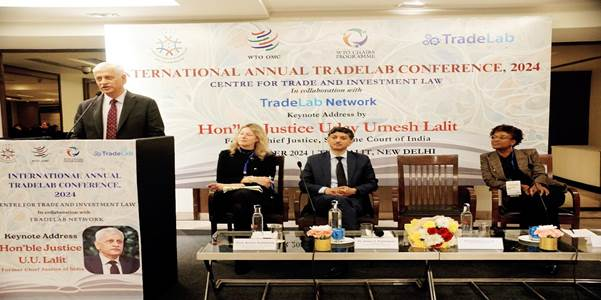Former Chief Justice of India Calls for Law Education Reforms at TradeLab Conference
Justice Lalit highlighted the Supreme Court of India's landmark rulings on affirmative action and the fundamental right to education, showcasing their role in fostering equitable socio-economic development.

- Country:
- India
Shri Justice Udai Umesh Lalit, Former Chief Justice of India, has called for reforms in legal education to empower lawyers to tackle complex issues related to social and economic justice. He delivered this message during the International Annual TradeLab Conference, hosted by the Centre for Trade and Investment Law (CTIL), a body under the Department of Commerce, Government of India, in collaboration with the TradeLab Network and the WTO Chairs Programme.
Held on December 13–14, 2024, at the Indian Habitat Centre, New Delhi, the conference emphasized enhancing teaching methods and clinical legal education in international trade and investment law.
Keynote Address Highlights
Justice Lalit highlighted the Supreme Court of India's landmark rulings on affirmative action and the fundamental right to education, showcasing their role in fostering equitable socio-economic development. He stressed the need for law schools to adopt an education model that merges academic rigor with practical training, enabling students to address global challenges within the ambit of international economic law.
Justice Lalit also praised the TradeLab initiative, which offers pro bono clinical legal education to law students. He commended its efforts in developing future legal experts who can navigate complex international trade and investment issues.
Opening Remarks by Shri Sanjay Chadha
Sanjay Chadha, Head of Public Policy at Uber Technologies, delivered the opening remarks, sharing insights into International Economic Law, which examines the intersection of legal frameworks and economic policies in global trade. Drawing from his experience in trade negotiations, he stressed the importance of building legal and negotiation expertise to enhance the effectiveness of international trade agreements.
Conference Highlights
The conference focused on enhancing the teaching and practice of international trade and investment law. Key sessions and discussions included:
- Day 1 Highlights:
- Closed-door sessions for the TradeLab executive committee.
- An experience-sharing session by TradeLab India.
- Discussions on the scope of clinical legal education and leveraging artificial intelligence in teaching pedagogy.
- Day 2 Highlights:
- Three panel discussions exploring current trends in international trade law.
- Presentations by student teams from MNLU Mumbai, GNLU, and QMUL London showcasing their TradeLab projects.
The conference concluded with a closing session summarizing insights on advancing TradeLab clinics globally.
Impact of the TradeLab Initiative
CTIL’s TradeLab-India initiative has been pivotal in advancing legal education in international economic law. The initiative follows a hub-and-spoke model, connecting CTIL with top law schools across India. To date, six national law universities are part of this network, producing over 15 impactful projects on topics ranging from WTO regulations to sustainable trade practices.
Globally, TradeLab, initiated by Professors Joost Pauwelyn and Sergio Puig, has grown since its inception in 2013. Incorporated as a non-profit under Swiss law, it includes prominent academics and practitioners such as Jennifer Hillman, Debra Steger, and Valerie Hughes.
TradeLab members actively engage in major international forums, including the WTO Public Forum. Its exclusive membership ensures that only committed universities and centers participate in its legal clinics and practicum programs, fostering high standards of research and practice.
Future Directions
The conference underscored the critical role of clinical legal education in equipping students to address pressing global trade issues. Justice Lalit’s vision, coupled with TradeLab’s pioneering efforts, paves the way for a new generation of legal professionals who can shape India’s global trade policies and promote socio-economic equity through legal innovation.










